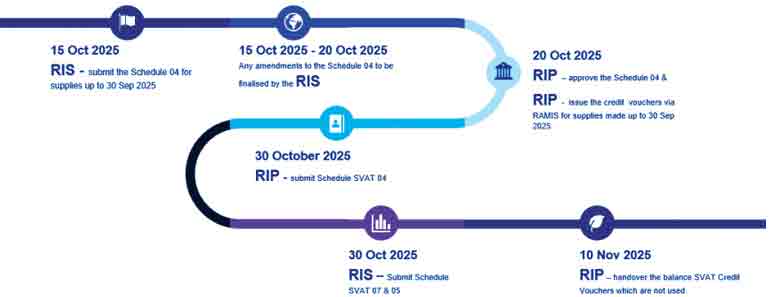Friday Feb 20, 2026
Friday Feb 20, 2026
Tuesday, 7 October 2025 02:02 - - {{hitsCtrl.values.hits}}
With the abolition of the Simplified VAT (SVAT) scheme expected to tighten liquidity and trigger short-term cash pressures for exporters and project suppliers, KPMG Sri Lanka is urging firms to begin compliance preparations immediately.
The firm advises businesses to verify their eligibility under the new Risk-Based VAT Refund Scheme, which took effect on 1 October, and ensure operational readiness in the Revenue Administration Management Information System (RAMIS) for electronic refund processing.
The Inland Revenue Department (IRD) has issued a regulation under Section 22(5)(f) of the Value Added Tax Act, No. 14 of 2002 (as amended), introducing “The Operation of Risk-Based Refund Scheme,” effective 1 October.
The new framework and transitional provisions are detailed in IRD Gazette Notification No. 2456/02 dated 29 September 2025, according to KPMG in Sri Lanka’s latest Tax Flash News. Eligible persons will be entitled to VAT refunds within 45 days from the due date to lodge their return, which must be submitted electronically via the RAMIS.
Under the new regime, eligibility for refunds will extend to exporters and suppliers engaged in specified projects.
According to the Gazette, ‘Eligible Exporters’ are registered persons whose value of zero-rated supplies during the preceding calendar year was greater than 50% of total supplies, based on the VAT return data for 2024, which will be reviewed annually thereafter.
Eligibility also applies to suppliers to Strategic Development Projects, Specified Projects under VAT schedules, and projects approved under Section 22(7) of the VAT Act.
Refund processing will now depend on a taxpayer’s risk category.
The Risk-Based Refund Scheme introduces a structured mechanism that classifies applicants as low, medium, or high risk, determined by compliance history, accuracy of filing, reliability, and overall behaviour.
Low- and medium-risk taxpayers will have their refunds processed without pre-verification, while high-risk taxpayers will receive refunds only after pre-verification is completed. The IRD will review each taxpayer’s risk rating every six months or whenever deemed necessary.
The introduction of the new refund mechanism coincides with the formal repeal of the existing SVAT framework. The previous SVAT Gazette Notification No. 1986/9 dated 27 September 2016 will be repealed from 1 October 2025.
KPMG highlighted several key deadlines for the phase-out: by 15 October, Registered Identified Suppliers (RIS) must submit schedules for supplies made up to 30 September 2025.
Between 15 and 20 October, RISs are required to finalise any amendments to Schedule 04, while Registered Identified Purchasers (RIP) must approve Schedule 04 and issue credit vouchers through the RAMIS by 20 October. Both RIPs and RISs are to submit the necessary SVAT schedules by 30 October, and RIPs must return any unused credit vouchers to the IRD by 10 November.
The Gazette also specifies procedures for debit and credit notes linked to suspended invoices issued between 1 April and 30 September.

Where such notes are raised after 1 October but within six months of the original invoice, details must be reported in Schedules SVAT 05a (debit notes) and SVAT 05b (credit notes) in Excel format and submitted to the IRD unit, where the taxpayer’s Taxpayer Identification Number (TIN) is registered.
Corresponding VAT returns must be amended and updated with relevant SVAT schedules, although such amendments are only for adjustment purposes and will not affect the original filing date or statutory time limits.
For businesses, the shift marks a decisive move away from suspended VAT mechanisms towards a risk-rated, time-bound refund system. Exporters and project suppliers are entitled to refunds within 45 days once returns are filed, but the actual turnaround will depend on compliance discipline.
Taxpayers with consistent filing, accurate reporting, and clean records are likely to secure a low- or medium-risk classification and faster refunds, while those with weak compliance histories may face delays due to pre-verification.
KPMG recommends that companies start housekeeping early, confirming if they meet the Eligible Exporter threshold based on 2024 VAT data, mapping all Strategic, Specified, and Section 22(7) contracts, updating TIN-level contact information with the IRD for electronic correspondence, and test-running RAMIS workflows ahead of October filings.
The firm notes that strong documentation and a clean return history will be key to maintaining a favourable risk rating and ensuring smooth refund processing under the new regime.